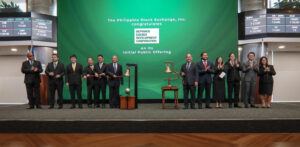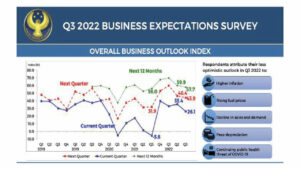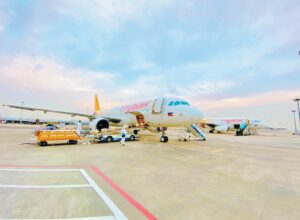Why Manila, Tokyo see eye-to-eye on rushing defense deal

THE PHILIPPINES and Japan have sharpened their focus on a targeted deal that would give Japanese troops easier access to the Southeast Asian nation, following recent tensions in the South China Sea, President Ferdinand R. Marcos, Jr. said on Monday.
Geopolitical analysts said the proposed Reciprocal Access Agreement (RAA) is unlikely to face setbacks since the two countries believe that it is beneficial to the stability of the Indo-Pacific region, beset by many authoritarian challenges, including China’s expansionist agenda and nuclear threats from North Korea.
Speaking to media in Tokyo, Mr. Marcos said he and Japanese Prime Minister Kishida Fumio want the RAA done as soon as possible.
“I think both the Prime Minister and I agree ASAP (as soon as possible),” he said on Monday, after the two leaders held a bilateral meeting on Sunday. “All of this as soon as possible… if not, sooner.”
While RAA talks between the two countries had been in the works “way before” China’s increasing intrusions into Philippine waters, “the incidents in the past few couple of months have certainly sharpened our focus when it comes to that,” Mr. Marcos said.
“That’s one of the things that I’m looking forward to,” he added. “That will have a very big multiplier effect on our capabilities.”
Mr. Marcos said the Philippines is forging such a security arrangement not only with Japan, but also with other countries amid increasing tensions in the South China Sea. “We also have the same kind of negotiations or discussions with many other countries,” he said.
PROVOCATION BY NORTH KOREAAside from China’s aggressive moves at sea, the Indo-Pacific region has also been beset by North Korea’s launching of missiles, including a long-range missile test on Dec. 17, which Mr. Marcos described as provocative.
“We join Japan, together with the rest of the ASEAN, in condemning the continued threat that the launching [of] ballistic missiles by the DPRK [Democratic People’s Republic of Korea] represents,” he said before delivering his speech at the meeting of Asia Zero Emission Community leaders at the Prime Minister’s Office in Tokyo, Japan, based on a press release from office.
Such “dangerous and provocative actions” by North Korea, Mr. Marcos said, “threaten and destabilize the region and the world.”
The alleged intercontinental ballistic missile — which was likely the third of the Hwasong-18 missile that North Korea also launched in April and July, flew about 1,000 kilometers from Pyongyang before landing in the waters between the Korean Peninsula and Japan, according to the military of South Korea, which was likely a target of the test following its moves to boost its nuclear deterrence plans with the United States.
MUTUAL INTERESTS AID PHL-JAPAN RAA TALKSBut Chester B. Cabalza, founder of Manila-based International Development and Security Cooperation, noted that the commitment between the Philippines and Japan to have an early conclusion for the defense pact comes on the heels of China’s aggression in the waterway.
“On a bigger scale, it is perceived as a rational strategy to foster collective deterrence against Beijing’s kinetic aggression and ambitious unilateralism in the region,” he said in a Facebook Messenger chat.
Japan has also been concerned over an increasingly expansionist China, which has been claiming Senkaku Islands in the East China Sea.
The Japanese foreign ministry on Sunday night said Mr. Marcos and Mr. Kishida “concurred to continue coordination to reach an early conclusion of the negotiations of the Reciprocal Access Agreement.”
“Both sides are in mutual agreement that the RAA will not only be beneficial for the Philippines and Japan but also for the stability of the whole region. With such a level of convergence between the two countries, it is unlikely that negotiations will suffer from any delays or setbacks,” Don Mclain Gill, who teaches international relations at the De La Salle University, said in a Facebook Messenger chat.
Mr. Marcos told Mr. Kishida on Sunday that the possible reciprocal agreement will give Manila “greater capability in terms of not only security, but also in terms of disaster preparedness and alleviation.”
“That is something that really is very, very significant to us and will bring to us a greater capacity to maintain the peace in the South China Sea,” he said.
In early November, the two countries agreed to begin formal talks on the proposed RAA, which is similar to Manila’s Visiting Forces Agreement with the United States and the Status of Visiting Forces Agreement with Australia.
Japanese troops have been annually observing joint US-Philippine war games, most recently in October 2022.
Mr. Marcos and Mr. Kishida witnessed the signing of a memorandum of cooperation between the Japanese Coast Guard and the Philippine Coast Guard, which has been on the frontline of the Philippines’ efforts to protect its claims in the South China Sea.
The PCG was among the several agencies that received additional funding under the proposed P5.768-trillion 2024 national budget following a House of Representatives’ move to strip non-security departments of their confidential and intelligence funds.




